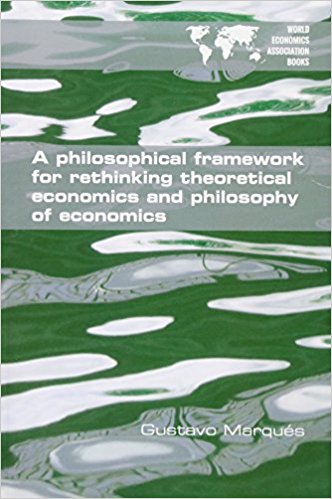From Gustavo Marqués If it is assumed that (a) both agents and theorists are aware they are facing an uncertain context, and (b) they hold epistemic and ontological beliefs consistent with this state of affairs, the proper way to approach economic phenomena should be very different from those that guide current modeling practice. Particularly, instead of mechanisms or economic regularities that keep running independently of agents’ expectations, the decisive role of lobbyists within open-ended and uncertain processes based on expectations should be incorporated into the analysis. The following assumptions could be the philosophical core of a new conceptual framework for economics: 1) There are economic processes based on expectations and characterized by radical uncertainty. Agents
Topics:
Editor considers the following as important: Uncategorized
This could be interesting, too:
tom writes The Ukraine war and Europe’s deepening march of folly
Stavros Mavroudeas writes CfP of Marxist Macroeconomic Modelling workgroup – 18th WAPE Forum, Istanbul August 6-8, 2025
Lars Pålsson Syll writes The pretence-of-knowledge syndrome
Dean Baker writes Crypto and Donald Trump’s strategic baseball card reserve
from Gustavo Marqués
If it is assumed that (a) both agents and theorists are aware they are facing an uncertain context, and (b) they hold epistemic and ontological beliefs consistent with this state of affairs, the proper way to approach economic phenomena should be very different from those that guide current modeling practice. Particularly, instead of mechanisms or economic regularities that keep running independently of agents’ expectations, the decisive role of lobbyists within open-ended and uncertain processes based on expectations should be incorporated into the analysis. The following assumptions could be the philosophical core of a new conceptual framework for economics:
1) There are economic processes based on expectations and characterized by radical uncertainty. Agents involved in such processes act in two different ways (as decision-makers or as lobbyists).
2) Ex-ante knowledge of invariant sequences of events is generally not possible (because there are few if any sequences of this kind); more importantly, such knowledge is unnecessary as support and justification for the implementation of economic policies.
3) The role of theoretical practice is to identify the many feasible “branches” of a “tree of plausible outcomes” as well as the restrictions that each sequence of events faces.
4) It is not known (and it is not possible to know) ex-ante what “branches” of the tree (what sequences of feasible alternative events) will prevail. Science cannot help us with this.
5) Other types of knowledge (common and practical knowledge as well as practical skills) are crucial for shaping those processes. It is a sort of know-how knowledge, closer to management and administration than to scientific economics.
6) Although – as was shown in point (3) – theoretical practice has an important role to play in shaping processes, what is crucial in this endeavor is another practice, which we denote as lobbying (interventional) practice, which is performed by a wide range of economic players (mostly different kind of interest groups who are able to operate on the relevant context and agents’ expectations).
 The whole concept of theoretical practice should be rethought if economic processes consistent with the above assumptions are the target. Chapter Eight argues that there are some mechanisms of economic transmission at macro level which represent feasible (or credible) sequences of economic events. I insist on the concepts of “feasibility” and “credibility”. Feasible sequences can happen (they are attainable in our world), although it all depends on the interventions of many different lobbyists along the process. Correctly interpreted – as open ended sequences, not as mechanisms – feasible models could be useful. Consequently, when I speak of an alternative theoretical practice I am not demanding the invention of a new way of doing economic theory (a demand that would be rather foggy). Part of the required theory is already available (I mean, the feasible one): it offers sequences of stages which in principle could be reached and provides points of intervention for governmental administration and the several interested lobbyers.
The whole concept of theoretical practice should be rethought if economic processes consistent with the above assumptions are the target. Chapter Eight argues that there are some mechanisms of economic transmission at macro level which represent feasible (or credible) sequences of economic events. I insist on the concepts of “feasibility” and “credibility”. Feasible sequences can happen (they are attainable in our world), although it all depends on the interventions of many different lobbyists along the process. Correctly interpreted – as open ended sequences, not as mechanisms – feasible models could be useful. Consequently, when I speak of an alternative theoretical practice I am not demanding the invention of a new way of doing economic theory (a demand that would be rather foggy). Part of the required theory is already available (I mean, the feasible one): it offers sequences of stages which in principle could be reached and provides points of intervention for governmental administration and the several interested lobbyers.
Philosophy of economics could also be reoriented. To go beyond mainstream philosophy of economics the usual ontological and epistemological assumptions of conventional modeling practice should be critically examined and philosophical support to the above mentioned assumptions should be provided. It means to incorporate into the agenda an analysis of the ontological features of economic processes, like uncertainty, and to call attention to the decisive role of the practice of lobbing, Such problems as what kind of rationality, learning and useful theoretical practice can be achieved under uncertainty should be addressed.
Read more of this article here in the current issue of WEA Commentaries.
